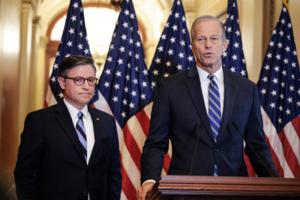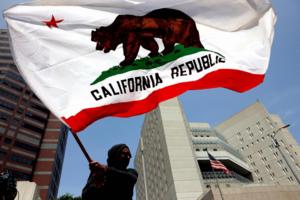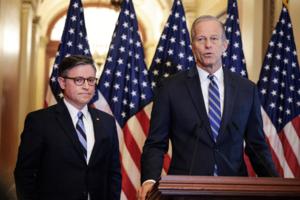Politics
/ArcaMax

Editorial: Republicans may find they need to get behind the ACA
House Republicans’ reconciliation bill seeks to pay for $5 trillion of tax cuts by slashing health-care spending, potentially leaving millions of Americans uninsured. The job of averting this self-inflicted disaster now falls to the Senate.
The legislation seeks to cut $793 billion from Medicaid, the health program for the poor. Half this sum...Read more

Jonathan Levin: Ted Cruz's Fed plan is a massive distraction
You can count on Senate Republicans to find pointless budgetary gimmicks to avoid talking about serious deficit reduction. In an interview last week with CNBC, Senator Ted Cruz floated the idea that the Federal Reserve should just stop paying interest to banks to save taxpayers money. Budget squeeze solved, easy peasy!
Here’s Cruz:
The ...Read more

Commentary: When an unnatural heat wave kills, has Big Oil committed murder?
Who, if anyone, is responsible when a person dies from unnatural heat? And what does the law have to say about it?
As a prosecutor for over a decade working on cases that implicated both civil and criminal liability, I have grappled with the gravity of bringing the weight of criminal law to bear in a range of contexts. Recently, along with ...Read more

Allison Schrager: A college degree is no longer a risk-free investment
My unifying theory of finance is that everything goes seriously wrong when people start seeing something — a bond, a mortgage-backed security, a crypto exchange — as risk-free when it isn’t. Look at any financial crisis or minor blowup, and that’s always where it starts.
Lately I have been wondering if my hypothesis applies to areas ...Read more

Editorial: Law must prevail over force -- There's no invasion of LA except for federal troops
Despite what President Donald Trump and his border czar Tom Homan claim, the only invasion of Los Angeles is by the illegally mobilized National Guard and Marines, brought into the city against the will of California Gov. Gavin Newsom.
The anti-ICE protests in L.A. were being contained and handled by local law enforcement, the robust LAPD and ...Read more

David M. Drucker: Will Republican gains among Hispanic voters last?
Barrels of ink were spilled for interviews with White working-class voters after President Donald Trump first captured the White House in 2016 as the press rushed to report why this coveted constituency had embraced the Republican Party. But the shift among working-class Hispanics has been even more dramatic — and has received only a fraction ...Read more

Commentary: Every shooting reflects our culture of violence, which the president cheers
On May 21, as they left the Capital Jewish Museum in Washington, Yaron Lischinsky and Sarah Milgrim were fatally shot, and because they were employees of the Israeli Embassy and the suspect was associated with pro-Palestinian politics, the story was reported in the familiar mode of Middle East politics.
The questions that reporters and pundits ...Read more

Editorial: High court not as divided as liberal critics might think
Conventional wisdom among leftist activists is that the U.S. Supreme Court has become hopelessly dominated by conservative ideologues more interested in right-wing “judicial activism” than in following the law. But this is a woefully inaccurate portrayal steeped in partisan rancor over President Donald Trump and his appointments to the court...Read more

Michael Hiltzik: Can Newsom block tax payments to the US government? No, but we do give more than we get back
California Gov. Gavin Newsom threw down the gauntlet to President Donald Trump last week after Trump threatened to cut off all federal funding to the state.
In a post Friday on X, Newsom observed: "We pay over $80 BILLION more in taxes than we get back" from the federal government. "Maybe it's time to cut that off."
Let's get the fundamental ...Read more

Editorial: Looking for government waste? Check DC this Saturday
It is altogether fitting that the nation should honor the 250th anniversary of the United States Army on June 14, 2025. That’s a judgment that was shared by the Biden administration, under which planning for the recognition of the Army began.
The United States could not survive without men and women willing to give and risk that last full ...Read more

Commentary: Why doing immigration the 'white way' is wrong
The president is granting refugee status to white South Africans. Meanwhile, he is issuing travel bans, unsure about his duty to uphold due process, fighting birthright citizenship, and backing massive human rights breaches against people of color, including deporting citizens and people authorized to be here.
The administration’s escalating ...Read more

Commentary: The scars from unrest can run deep, for protesters, residents and even authorities
The heavy-handed responses by the Trump administration to ongoing protests in Los Angeles reveal how little imagination our politicians continue to have when it comes to grasping the causes and consequences of social unrest.
Last Friday, in response to increasingly bold and reckless raids by Immigration and Customs Enforcement, Angelenos began...Read more

Editorial: Republicans may find they need to get behind the ACA
House Republicans’ reconciliation bill seeks to pay for $5 trillion of tax cuts by slashing health-care spending, potentially leaving millions of Americans uninsured. The job of averting this self-inflicted disaster now falls to the Senate.
The legislation seeks to cut $793 billion from Medicaid, the health program for the poor. Half this sum...Read more

Commentary: Chicago public officials must cut the fat before begging for taxpayer bailouts
As Yankees baseball legend and iconic quipster Yogi Berra is famously quoted as saying, “It’s deja vu all over again.”
Once again the perennially and preternaturally cash-strapped city of Chicago, State of Illinois, Chicago Transit Authority, Metra and Chicago Public Schools are pointing at Washington, D.C., with their hands out, shaking ...Read more
POINT: America's law-and-order problem is Donald Trump
Yes, America does have a law-and-order problem. It’s the president of the United States.
Throughout U.S. history, the best presidents have sparingly sought to use federal forces not to exacerbate tensions but as a last resort to de-escalate violence, protect constitutional rights and restore order. Whether Democratic or Republican, when faced...Read more

COUNTERPOINT: Crime is down, but chaos is up
Protests are erupting in Los Angeles and other cities, with streets filled with demonstrators clashing with police, National Guard troops and Marines deployed under a presidential order.
Scenes of civil unrest, from property damage and looting to tense standoffs clouded in tear gas, have dominated headlines, fueling a sense of chaos and ...Read more

Commentary: Why nostalgia for the 1950s of 'Leave it to Beaver' persists in America's religious right
Anyone looking to drench themselves in the 1950s nostalgia currently favored by the religious right in America should consider watching “Leave It to Beaver” stoned. Which is what I did with an old friend in the 1980s while attending graduate school at the University of California-Berkeley.
Nostalgia for the ’50s — that land beyond time ...Read more

Martin Schram: Fanning the flames while covering the fires
President Donald Trump always seemed to get it.
Way back when he was just a born-rich whippersnapper from the Queens chasing The Big Spotlight so he could make Manhattan know who the hell he was, The Donald always seemed to know he could manipulate some in the news media who were eager to cover him as if he was news.
So he began calling New ...Read more

Editorial: Why Greta Thunberg's ignorance of Oct. 7 is a missed lesson for all
Activist Greta Thunberg is a hypocrite for refusing to watch all the footage of the Oct. 7 Hamas terror attack on Israel.
The Herald did the opposite.
The heart-wrenching clips compiled by the Israel Defense Forces (IDF) are a “place beyond words,” as we wrote in November of 2023, leaning on author Jerzy Kosinski’s Holocaust tale “The ...Read more

Commentary: There's a better way to honor our veterans
Later this month, on June 14th, there will be a military parade in Washington in honor of the 250th anniversary of the United States Army. Coincidentally, the day of the festivities is also the 79th birthday of President Donald J. Trump.
Celebrating our troops makes sense, but there’s got to be a better way. The Army estimates that the parade...Read more























































